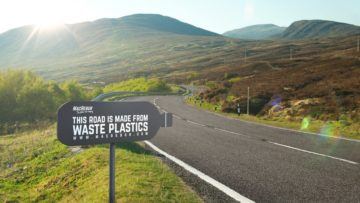Chermaine Lee in Future Planet:
 On a road into New Delhi, countless cars a day speed over tonnes of plastic bags, bottle tops and discarded polystyrene cups. In a single kilometre, a driver covers one tonne of plastic waste. But far from being an unpleasant journey through a sea of litter, this road is smooth and well-maintained – in fact the plastic that each driver passes over isn’t visible to the naked eye. It is simply a part of the road. This road, stretching from New Delhi to nearby Meerut, was laid using a system developed by Rajagopalan Vasudevan, a professor of chemistry at the Thiagarajar College of Engineering in India, which replaces 10% of a road’s bitumen with repurposed plastic waste.
On a road into New Delhi, countless cars a day speed over tonnes of plastic bags, bottle tops and discarded polystyrene cups. In a single kilometre, a driver covers one tonne of plastic waste. But far from being an unpleasant journey through a sea of litter, this road is smooth and well-maintained – in fact the plastic that each driver passes over isn’t visible to the naked eye. It is simply a part of the road. This road, stretching from New Delhi to nearby Meerut, was laid using a system developed by Rajagopalan Vasudevan, a professor of chemistry at the Thiagarajar College of Engineering in India, which replaces 10% of a road’s bitumen with repurposed plastic waste.
India has been leading the world in experimenting with plastic-tar roads since the early 2000s. But a growing number of countries are beginning to follow suit. From Ghana to the Netherlands, building plastic into roads and pathways is helping to save carbon emissions, keep plastic from the oceans and landfill, and improve the life-expectancy of the average road.
By 2040, there is set to be 1.3 billion tonnes of plastic in the environment globally. India alone already generates more than 3.3 million tonnes of plastic a year – which was one of the motivators behind Vasudevan’s system for incorporating waste into roads. It has the benefit of being a very simple process, requiring little high-tech machinery. First, the shredded plastic waste is scattered onto an aggregate of crushed stones and sand before being heated to about 170C – hot enough to melt the waste. The melted plastics then coat the aggregate in a thin layer. Then heated bitumen is added on top, which helps to solidify the aggregate, and the mixture is complete.
More here.
